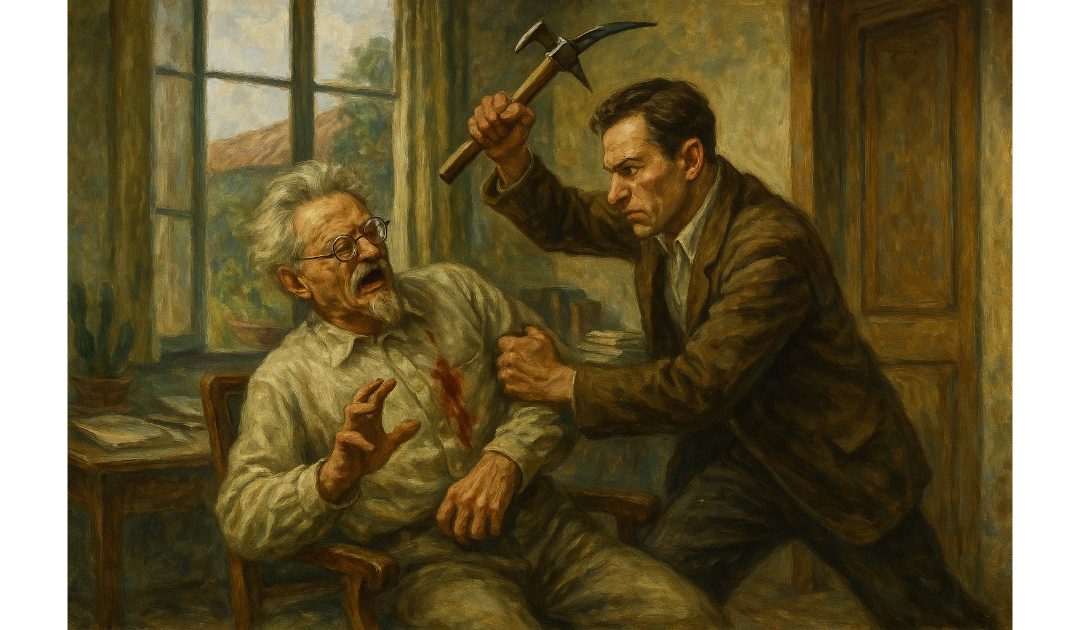On the 20th of August, 1940, Leon Trotsky was fatally wounded in Mexico City when Ramón Mercader attacked him with an ice axe.
Leon Trotsky, born Lev Davidovich Bronstein on the 7th of November, 1879, in Yanovka, Ukraine (then part of the Russian Empire), was a revolutionary Marxist thinker, political theorist, and a key figure in the early years of the Soviet Union. His life was marked by prolific writings, fervent activism, and dramatic political conflicts, culminating in his assassination in 1940.
Trotsky came from a prosperous Jewish farming family. Despite his privileged background, he gravitated towards radical political ideologies during his adolescence. His university years saw him increasingly involved in revolutionary activities, leading to his arrest and exile to Siberia in 1898. It was during this period that he adopted the pseudonym ‘Trotsky’.
Escaping Siberian exile in 1902, Trotsky made his way to London, where he became acquainted with exiled Russian Marxists, including Vladimir Lenin. Their collaboration in the early years was both productive and contentious, as Trotsky often found himself at odds with Lenin over ideological and strategic matters, particularly concerning party organisation and centralisation of power.
The 1905 Russian Revolution, a precursor to the more significant upheavals of 1917, was a defining moment for Trotsky. Returning to Russia, he emerged as a leading figure, notably as Chairman of the St. Petersburg Soviet. His eloquence and organisational skills distinguished him, but the revolution’s failure led to his arrest and another stint in Siberian exile. Demonstrating remarkable resilience, he escaped again, resuming his revolutionary activities across Europe.
World War I intensified Trotsky’s anti-imperialist stance. He condemned the conflict as an imperialist war that sacrificed workers for the ambitions of ruling classes. His writings during this period solidified his reputation as a formidable Marxist theorist. The Bolshevik Revolution of 1917 provided Trotsky with an opportunity to apply his theories practically. Reuniting with Lenin, he played a pivotal role in orchestrating the October Revolution, which led to the overthrow of the Provisional Government and the establishment of Bolshevik rule.
As Commissar for Foreign Affairs, Trotsky negotiated the Treaty of Brest-Litovsk with Germany, ending Russia’s involvement in World War I. Despite his initial reluctance and revolutionary zeal for a broader European uprising, he pragmatically secured peace to consolidate Bolshevik power domestically. His most significant contribution came as the founder and commander of the Red Army during the Russian Civil War (1918-1921). Under his leadership, the Red Army triumphed against various adversaries, ensuring the survival of the Bolshevik regime.
However, Trotsky’s fortunes waned following Lenin’s death in 1924. His intellectual prowess and revolutionary credentials posed a threat to Joseph Stalin, who adeptly manoeuvred to marginalise him within the Communist Party. Trotsky found himself increasingly isolated, culminating in his expulsion from the party in 1927 and subsequent exile from the Soviet Union in 1929.
Trotsky’s exile years were marked by prolific writing and relentless opposition to Stalin’s regime. He settled in various countries, including Turkey, France, and Norway, before finally residing in Mexico. There, he continued to champion the cause of international socialism, criticising Stalin’s bureaucratic authoritarianism and the perversion of the revolution‘s ideals. Trotsky articulated his opposition through the formation of the Fourth International in 1938, aiming to unite revolutionary Marxists against both capitalist democracies and Stalinist totalitarianism.
Tragically, Trotsky’s defiance made him a target for Stalin’s far-reaching purges. On the 20th of August, 1940, a Spanish communist and NKVD agent, Ramón Mercader, assassinated Trotsky in his Mexican home with an ice axe. Trotsky succumbed to his injuries the following day, leaving behind a complex legacy.
Trotsky’s contributions to Marxist theory are substantial. His theory of “permanent revolution” posited that socialist revolutions could bypass the bourgeois-democratic phase, especially in less developed countries, and that such revolutions needed to be international to survive. His critiques of Stalinism presciently highlighted the dangers of bureaucratic consolidation, centralised authority, and the repression of democratic dissent within socialist states.
Today, Trotsky remains a polarising figure. Admired by many for his intellectual brilliance, revolutionary fervour, and steadfast opposition to tyranny, he is also criticised for his role in the early Soviet state’s repressive mechanisms, particularly during the civil war. Nevertheless, his writings continue to inspire political movements and scholars, reflecting the enduring relevance of his ideas in debates about socialism, democracy, and revolutionary change.

